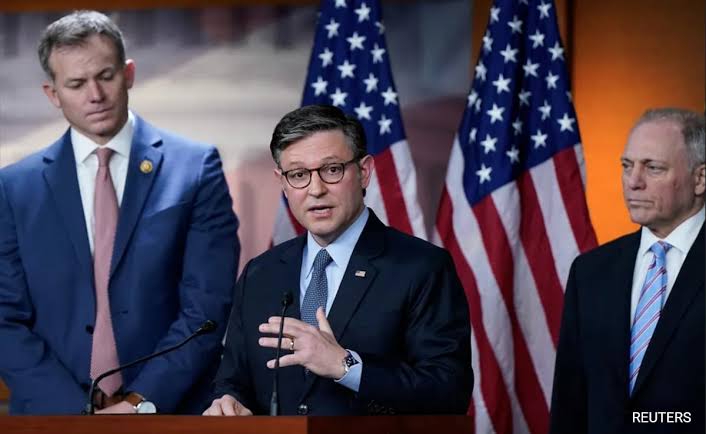NEWS
Breaking News: Mike Johnson Delivers Blow to Trump’s Hopes of Third Term as President On April 1, 2025, House Speaker Mike Johnson, a prominent Republican and constitutional lawyer, addressed speculation surrounding President Donald Trump…..See More

Mike Johnson Delivers Blow to Trump’s Hopes of Third Term as President.
On April 1, 2025, House Speaker Mike Johnson, a prominent Republican and constitutional lawyer, addressed speculation surrounding President Donald Trump’s interest in pursuing a third term in office, effectively tempering the president’s ambitions by highlighting the significant constitutional barriers in place.
The remarks, made during a press interaction at the Capitol, come amid Trump’s repeated public musings about extending his presidency beyond the two-term limit enshrined in the U.S.
Constitution—a limit that has shaped American governance since the ratification of the 22nd Amendment in 1951.
Trump’s Third-Term Ambitions
Donald Trump, now in the early stages of his second term following his victory in the 2024 presidential election, has not shied away from suggesting he might seek to remain in office beyond 2029.
In a telephone interview with NBC’s Meet the Press on March 30, 2025, Trump stated, “I’m not joking” about a third term, adding, “A lot of people want me to do it.”
The 78-year-old president reiterated this sentiment to reporters aboard Air Force One later that day, claiming widespread public support for his continued leadership.
These comments echo earlier instances during his political career where he has floated the idea—sometimes jokingly, sometimes with apparent seriousness—of serving beyond the constitutional limit.
Trump’s remarks have fueled both enthusiasm among his supporters and alarm among critics, particularly given his past refusal to concede the 2020 election and his role in the events leading to the January 6, 2021, Capitol attack.
Just days into his second term, on January 23, 2025, Representative Andy Ogles, a Tennessee Republican, introduced a proposal to amend the 22nd Amendment, which currently prohibits any individual from being elected president more than twice.
Ogles’ amendment would allow Trump to run for a third term in 2028 while barring other living two-term presidents—Bill Clinton, George W.
Bush, and Barack Obama—from doing the same, citing their consecutive terms.
However, the proposal faces an uphill battle in a deeply divided Congress and country.
Johnson’s Constitutional Reality Check
Enter Mike Johnson, the Speaker of the House and a key figure in the Republican Party, whose comments on April 1 appear to have dealt a significant blow to Trump’s third-term aspirations.
Speaking to reporters, Johnson acknowledged the theoretical possibility of such a move but emphasized its impracticality.
“There’s a constitutional path. You have to amend the Constitution to do it,” he said. “
That’s a high bar.” His remarks underscore the daunting process required to alter the Constitution:
a two-thirds vote in both the House and Senate, followed by ratification by three-fourths of the states—or a constitutional convention called by two-thirds of state legislatures, an even rarer occurrence.
Johnson, who has been a steadfast ally of Trump, including during the former president’s impeachment trials and efforts to challenge the 2020 election results, tempered his response with a nod to Trump’s popularity.
“I understand why some of the Americans do wish he would run for a third term, because he’s accomplished so much in his first 100 days that they wish it could go on for much longer,” he said.
Yet, he quickly pivoted to realism: “I think he recognizes the constitutional limitations, and I’m not sure that there’s a move afoot to amend the Constitution.”
Johnson later added that he has discussed the matter privately with Trump and takes the president “at his word” regarding his understanding of these limits.
The Political and Legal Landscape
The 22nd Amendment, enacted in response to Franklin D.
Roosevelt’s unprecedented four-term presidency, is a cornerstone of modern American political structure.
Amending it is a Herculean task, especially in today’s polarized climate.
With Republicans holding a slim majority in the House and a nearly even split in national political sentiment, securing the necessary supermajorities in Congress and among the states seems improbable.
Johnson’s assessment aligns with this reality, suggesting that while Trump’s base may clamor for more time, the broader political will—and legal framework—may not bend.
Despite Ogles’ early legislative push, Johnson downplayed any significant momentum within the GOP to pursue such an amendment.
“There’s no current movement to amend the Constitution,” he noted, distancing himself from the Tennessee representative’s proposal.
This stance contrasts with the enthusiasm of some Trump loyalists, who see a third term as a way to cement his legacy.
However, even within the party, the idea has met mixed reactions, with some allies dismissing Trump’s comments as playful rhetoric rather than a serious policy goal.
Trump’s Response and Public Perception
Trump has continued to stoke the conversation, as evidenced by his remarks on January 27, 2025, during a meeting with House Republicans in Doral, Florida.
Turning to Johnson, he asked, “Am I allowed to run again? Mike, I better not get you involved in that argument.”
The quip, delivered with a characteristic blend of humor and ambiguity, reflects Trump’s strategy of keeping the idea alive without committing to a concrete plan.
He has also tied the notion to his narrative of electoral












